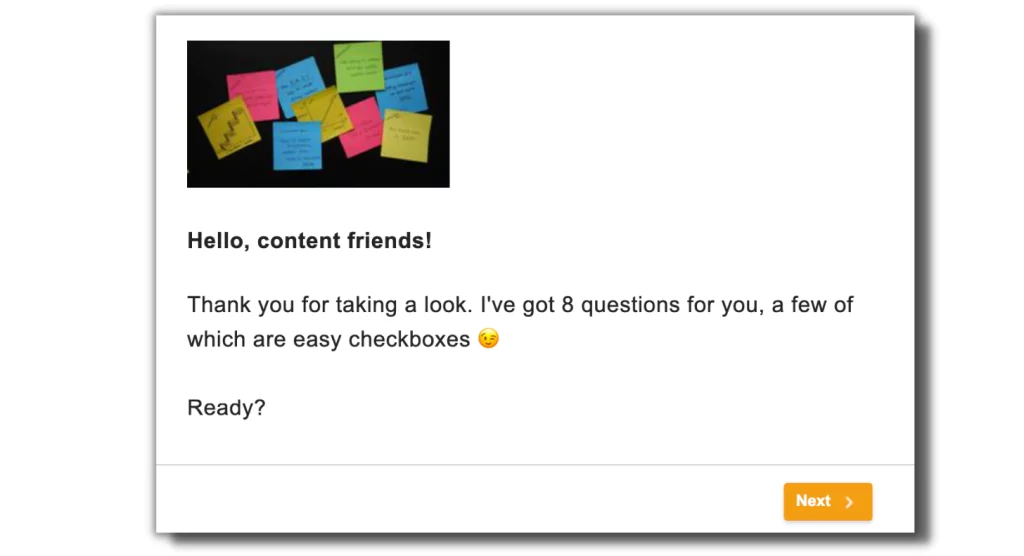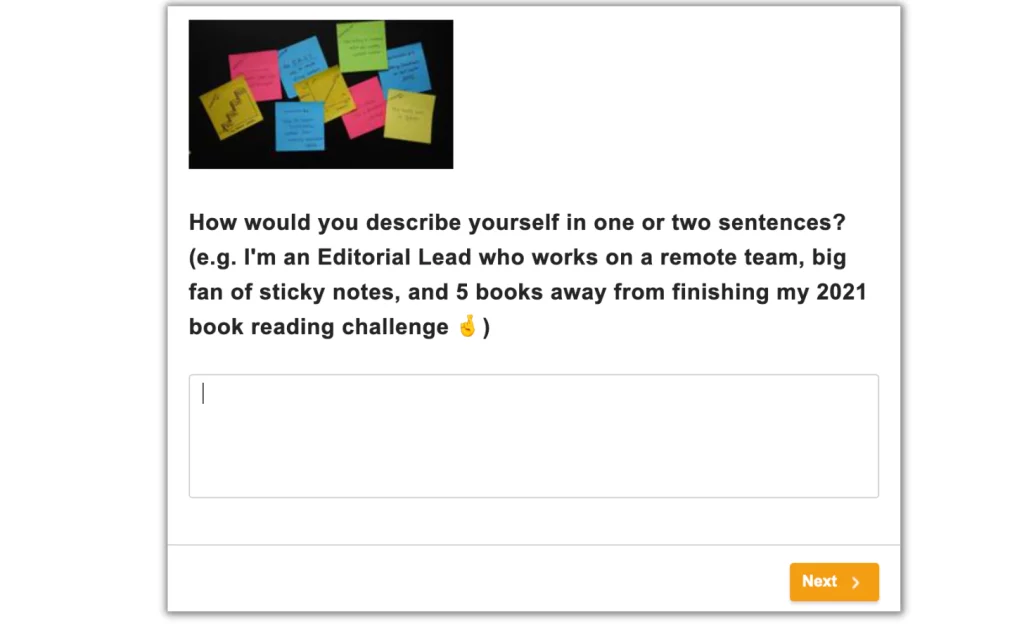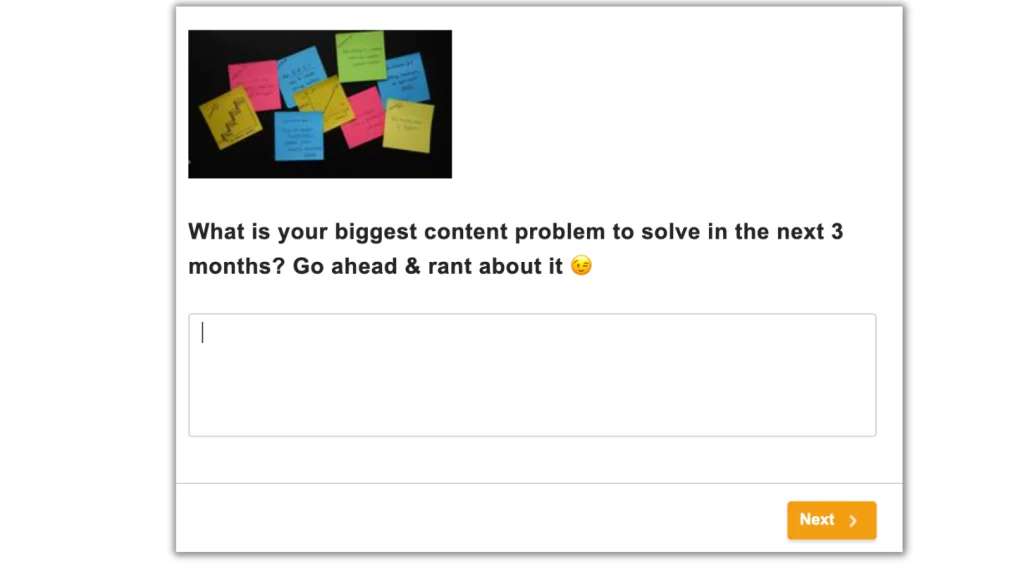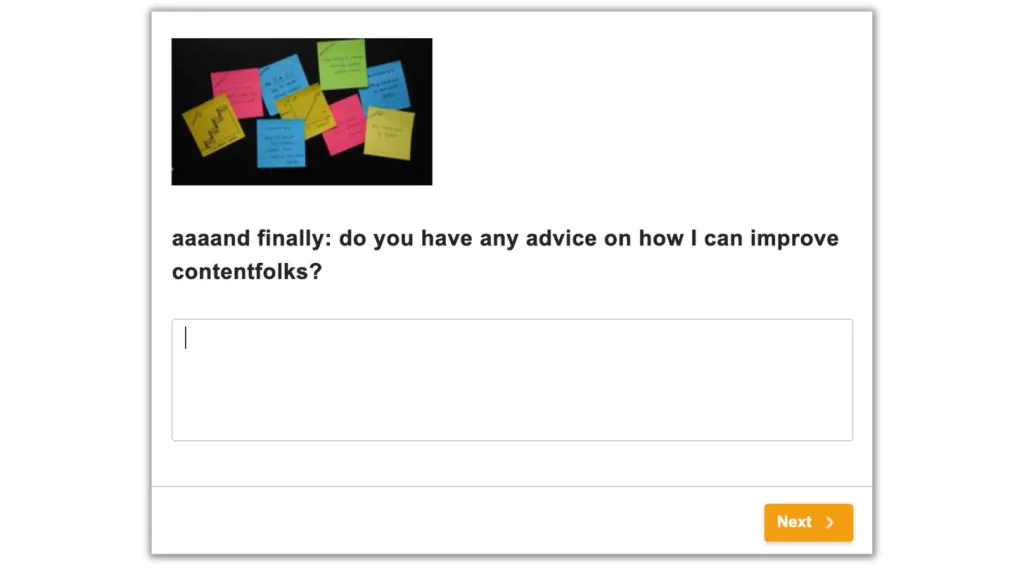Welcome to contentfolks—a fortnightly newsletter with short lessons & ideas about content that makes a difference, sparks action, and truly serves its audience. Thank you for being here!
Hey 👋
In computer science, “garbage in, garbage out” (GIGO) is the idea that the output of a computer function is only as good as the input it receives. For example, an algorithm trained on incomplete or biased datasets inevitably delivers incomplete and biased results.1
(a less polite, more emphatic version of GIGO is SISO: sh*t in, sh*t out 💩)
I was thinking about this GIGO concept a few weeks ago, before launching my first contentfolks survey. I wanted to avoid a bad input → bad output scenario, where poor or irrelevant questions would land me straight into a nightmare of unusable answers.

In the two weeks since launch, 72 of you filled in the survey—and because I asked good questions, I got fantastic answers back. In fact, your collective replies amount to 8,092 words (!), which is practically an ebook’s worth of valuable insight 🤩
To get these results, I spent a lot of time figuring out what to ask and how. Below is my annotated thought process that you can use when running your own surveys or interviews.
💡 A practical example 💡
To come up with good questions that lead to insightful, meaningful answers:
- Start from the end goal
- Define what you will (and will not) ask
- Choose your questions
- Pick your words carefully
Step 1: start from the end goal
To run a good survey or interview, I never jump straight into writing questions: I start from identifying my end goals instead, asking myself why am I even doing it in the first place? What do I want to know—and why do I want to know it?.
In this case,I identified three goals:
🎯 Goal 1, audience discovery: get a clear, tangible sense of who you are so I can tailor my content accordingly.
🎯 Goal 2, inspiration: find ideas and topics that resonate with my audience so I can cover them in the next 3-6 months.
🎯 Goal 3, optimisation → find out what I need to change so more people can get more value from my work.
Step 2: define what you will (and will not) ask
With goals in place, I think about what information will help me achieve them vs. what is irrelevant and can be discarded.
In this case:
🎯 Goal 1, audience discovery → ask about role, seniority, work situation (e.g in-house marketer, freelance), etc; do not collect standard demographic data (e.g. gender, age) because this information has no impact on my work.
🎯 Goal 2, topic inspiration → ask about existing content problems, pain points, and/or jobs-to-be-done, and encourage respondents to elaborate (the more details, the better).
🎯 Goal 3, optimisation → ask how people found out about contentfolks to see what’s driving them here; ask for advice on what to change and improve.
Step 3: choose your questions
Having worked backwards from the result and with a clear sense of why I’m doing what I’m doing, I’m ready to select the most appropriate questions to get there.
After a bit of tinkering, I settled on a list of 8—a reasonable amount that would not take too much of your time but still give me plenty to work with:
🎯 Goal 1, audience discovery
– How would you describe yourself?
– What job title/role do you identify with the most?
– Where do you work?
-Where in your marketing career are you?
🎯 Goal 2, topic inspiration
– What is your biggest content problem to solve in the next 3 months?
– Which topic would, if I wrote about it, make you think “FINALLY”?
🎯 Goal 3, optimisation
– Where did you hear about this newsletter?
– Do you have any advice on how I can improve?
Step 4: pick your words carefully
The way a question is worded can have a big impact on how it gets answered.
In this case, I paid particular attention to how my open-ended questions were written. For example:
Q1: How would you describe yourself in one or two sentences? (e.g. I’m an Editorial Lead who works on a remote team, big fan of sticky notes, and 5 books away from finishing my 2021 book reading challenge)

Why this question → it helps me understand who you are as humans beyond job titles and career levels.
Why this wording → this is a very personal question, so I first give you a personal example to establish fairness and make ours a balanced exchange. I also mix work & life factoids so you know you can do the same when you answer.
🔎 Fun insight: I’ve already read all replies, and I’m not writing this issue for a bunch of generic content marketers: I’m writing it for a bunch of rope jumpers, pet parents, American football watchers, equestrians, wine & cheese enthusiasts, list lovers, procrastinators, mind mappers, and Bob Ross calendar holders who also happen to be content marketers ♥️
Q2: What is your biggest content problem to solve in the next 3 months? Go ahead & rant about it.

Why this question → once I know what you’re dealing with, I can write something that helps.
Why this wording → this is essentially me asking what I should write about next, but the focus is on your struggle rather than my needs. I also added the “go ahead & rant about it” line to signal that I’d be a sympathetic virtual ear if you needed to vent.
🔎 Fun insight: this one really resonated. Most of you took me literally and shared paragraph-long rants—which is not great because you’re obviously frustrated, but A) strength in numbers: you are not alone!, and B) I now have ideas for at least the next 10 issues of contentfolks.
Q8: do you have any advice on how I can improve contentfolks?

Why this question → because I want to improve things for you without making assumptions about what works or doesn’t.
Why it’s worded like this → I went with ‘advice’ and not ‘feedback’ because studies show2 that, when asked to give feedback, people usually judge past performance instead of imagining future improvement; when asked for advice, they focus less on evaluation and more on future actions instead, which results in more critical and actionable input. I also added the word ‘finally’ to let you know that the survey was wrapping up.
Whew! This was a long one—if you made it this far, chances are you are as big a survey nerd as I am. I hope this write-up gave you some useful insight 😉
Thank you for reading, replying to the survey, and just generally… being here. I’ll be back on December 22 for the last newsletter of 2021 (!).

1: Yikes—I mean, it’s not brand new information, but it’s scary nonetheless.
2: This HBR article is the reason why I’ve been replacing the word ‘feedback’ with ‘advice’ both here and at work. It’s been working well for me, so I recommend giving it a try.